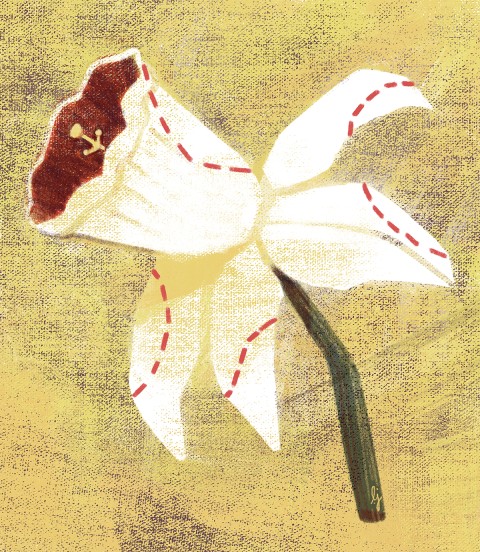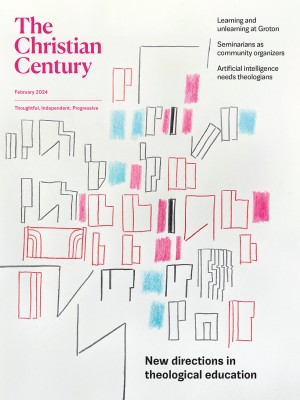The bones in God’s garden
Will my daffodil bulbs overcome their trauma and rise up despite the odds? Will we?

(Illustration by Luisa Jung)
Settling into more of a country life in retirement, my husband and I planted 50 daffodil bulbs. As a first-time daffodil planter, I did my research and decided that the “weatherproof large-cupped daffodil mix” would be the ideal bulbs. They are advertised as “the workhorses of the daffodil world,” an odd description for flowers, but I was won over by the promise that they “always look fresh and festive.”
I carefully studied the instructions and we followed them to a T, planting the bulbs five to six inches apart and deep. I bought the special daffodil fertilizer and sprinkled it over the dirt. We watered, and I covered the dirt with fallen leaves to dissuade curious deer, even though these workhorses are said to be “shunned by hungry deer,” another point in their favor. In fact, I learned that daffodils are poisonous for the deer, squirrels, and woodchucks who share our backyard, and they instinctively avoid them. I would have liked to purchase tulip and crocus bulbs, too, but I read that these are like woodland bonbons for our furry neighbors.
Read our latest issue or browse back issues.
Having done everything right, all we had to do was wait through the winter until April or May, when we would be rewarded with glorious clusters of daffodils under the trees. In my mind’s eye, I could see them spreading out over the years. Each spring my heart would dance like Wordsworth’s with a host of golden daffodils, ever fresh and festive.
You will likely be less surprised than I was to learn that squirrels do not follow the instructions. Through the window, my husband caught them scratching through the leaves and dirt and digging up our bulbs. He was too late to halt the damage. At some point, the squirrels’ own survival instincts must have kicked in and they scampered off to play games of chase among the trees’ last, sunlit, yellow leaves—but only after leaving bite marks and taking chunks from the bulbs left lying about as sorry-looking damaged goods. I saw no squirrels lying about, so apparently they ditched the stolen bites before ingesting too much poison. My husband replanted the traumatized bulbs to see if they might still produce golden blooms on the advertised strong, 20-inch stems come spring.
The planting occurred in early November. Now it’s nearly Lent and getting closer to the day of reckoning. Will the bulbs somehow overcome the trauma inflicted upon them? Will they rise up despite the odds?
Will we? It has been an especially traumatic fall and winter. As the daughter of a Shoah survivor and the descendant of many family members who perished, the irruption of terror and violence strikes in soul-crushing, complex ways. But only those with hearts of stone could be untouched by the horrors perpetrated against Israelis and escalated exponentially against any and all Palestinians—and this is not to mention the private, unwanted desires that find us under the surface and the offenses that come back to bite us. Personally, I don’t want to mention those, but God unto whom all hearts are open, all desires known, and from whom no secrets are hid already knows.
Lent means spring, but Lent is not the natural growing season, which comes as a great relief. Lent is not about how we naturally defy the odds to overcome trauma or foolishness or reap the rewards of following the instructions. Some seasons leave our hopes and dreams as damaged goods, we ourselves like marred bulbs left with bite marks and missing chunks. Or, as we hear on Ash Wednesday, we are dust.
It’s actually such a comfort to hear those stark, honest words. We don’t have to pretend that if we just follow the instructions, things will turn out as we expect and want. Or even that we unfailingly manage to observe those instructions. We don’t have to rely on our willpower to fight off the temptations that catch us by surprise. Or heal ourselves from damage and trauma. Remember you are dust. Fragile, vulnerable, human. Yet, the cross traced on our foreheads reminds us that Jesus is in the dust with us, that we are deeply beloved dust.
The Isaiah 58 text assigned for Ash Wednesday urges us “not to hide ourselves from our own kin” (v. 7). The prophet reminds us that our dusty beginnings and the dirt under our fingernails connect us with one another; with our neighbors who need liberation, food, and shelter; and with the entire universe. In spite of our many and sometimes divisive and even explosive differences, we are kin—not just familial kin, but kin with all who come from the same cosmic womb and require the same tender mercy.
Isaiah also tells us that when we embrace the neighbor-loving actions he names, instead of shouldering one more burden, we will find our true spring: God will “satisfy your needs in parched places, / and make your bones strong; / and you shall be like a watered garden, / like a spring of water, / whose waters never fail” (58:11).
I read that if you overwater daffodil bulbs, they will rot. Then again, if you underwater, they will dry out before roots can emerge. How to be certain of the balance? But that’s not in Isaiah’s purview. We are not the ones who water in the prophet’s watered garden, nor in the garden of Easter morning. We are, however, the ones whose marred and brittle bones will rise up to dance with a golden host. Not because it’s in the nature of the bones or the season, but because the improbable nature of God’s love will bring us into a new creation, a watered garden, where God willing, there is room for deer and squirrels and daffodils and even tulips.






